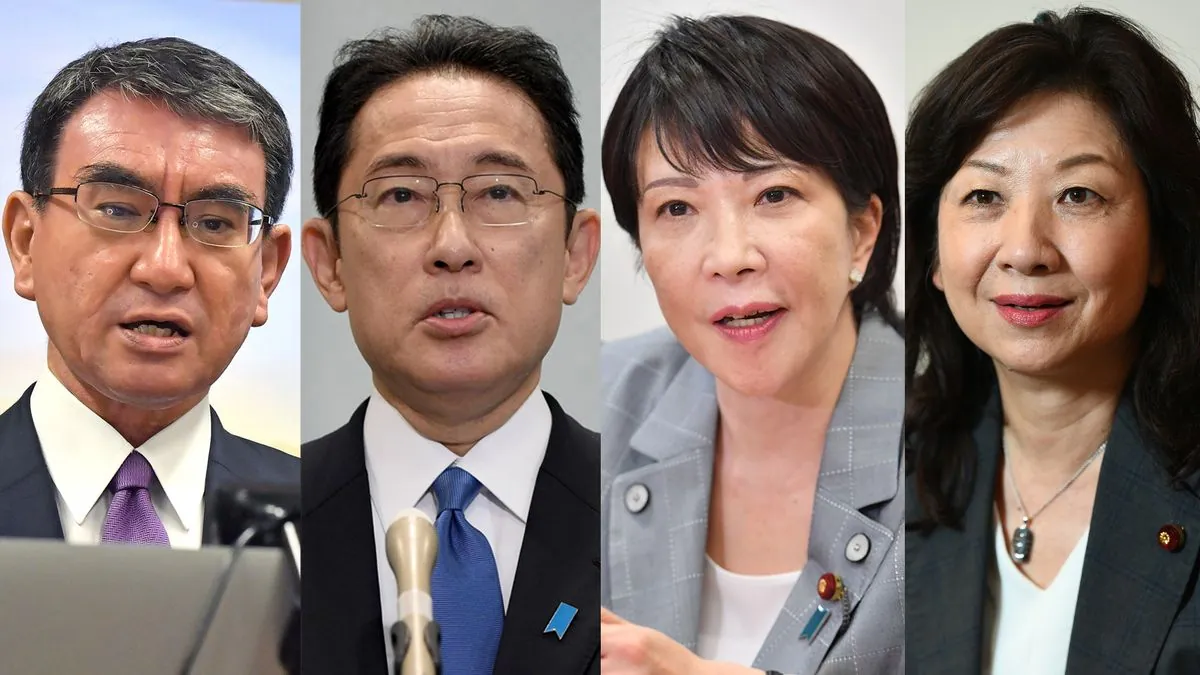Japan's Liberal Democratic Party (LDP), which has dominated the country's politics since its founding in 1955, is poised for a landmark leadership contest on September 29, 2024. This election could potentially result in Japan's youngest prime minister or its first female leader, marking a significant shift in the nation's political landscape.
The race to succeed outgoing Premier Fumio Kishida, who announced his resignation in August 2024 amidst a series of scandals, has drawn a record nine candidates. Among them, three frontrunners have emerged: Shinjiro Koizumi, 43, former environment minister; Sanae Takaichi, 63, economic security minister; and Shigeru Ishiba, 67, former defense minister.
The upcoming election is notable for its unpredictability, a rarity in Japanese politics. This uncertainty stems from the recent disbanding of several LDP factions following a political donations scandal, weakening the traditional power structures within the party. The LDP's complex system of factions has historically played a crucial role in influencing party decisions and leadership outcomes.
The election process involves votes from 368 LDP lawmakers and an equal number distributed among rank-and-file members. If no candidate secures a majority, a run-off will be held between the top two contenders. The results are expected around 05:20 GMT, with a potential run-off result due at 06:30 GMT.
The new leader will face significant challenges both domestically and internationally. Japan's economy, the world's third-largest by nominal GDP, is grappling with issues such as an aging population, with over 28% aged 65 or older, and a declining birthrate that reached a record low in 2024. The country also boasts the world's highest debt-to-GDP ratio, exceeding 260%.
On the international front, the new prime minister must navigate an increasingly volatile security environment in East Asia, marked by an assertive China and a nuclear-armed North Korea. Japan's defense budget has been steadily increasing since 2012, reaching record levels in recent years, reflecting these growing security concerns.
Shinjiro Koizumi, son of a former prime minister who governed from 2001 to 2006, could become Japan's youngest premier if elected, surpassing Ito Hirobumi, who took office at 44 in 1885. Koizumi has pledged to reform Japan's rigid labor rules, a move that has garnered mixed reactions.
Sanae Takaichi could make history as Japan's first female prime minister, a significant achievement in a country that has had only one female governor in its history. Takaichi, a proponent of "Abenomics" and "womenomics," policies aimed at reviving the economy and promoting women's participation in the workforce, has been critical of the Bank of Japan's efforts to raise interest rates from historic lows.
Shigeru Ishiba, a veteran politician on his fifth and final leadership bid, has proven popular among rank-and-file members but has faced challenges within the party due to his willingness to challenge previous leaders.
The outcome of this election will have far-reaching implications for Japan's future. The new leader must address pressing issues such as the country's aging population, economic challenges, and regional security concerns. Additionally, they will need to navigate complex relationships with neighboring countries, particularly regarding sensitive topics like visits to the Yasukuni Shrine, which has been a source of tension with China and South Korea since the 1980s.
As Japan approaches this pivotal moment, the world watches closely to see how the country's leadership will shape its domestic and foreign policies in the coming years.
